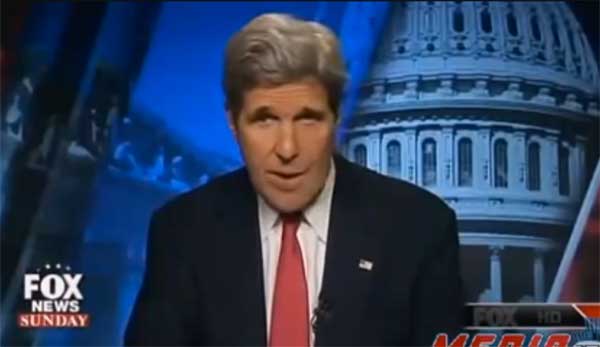The United States has formalised the emissions reductions targets they will take to the United Nations Paris climate talks in December this year, committing to an economy-wide reduction of at least 26 per cent on 2005 emissions levels by 2025.
John Kerry, the U.S. Secretary of State described climate change as “the defining challenge of our generation” wile announcing the commitment yesterday. He urged other nations to formally submit their targets soon.
“Now it’s time for other nations [to]come forward with their own targets to help ensure we can reach a global agreement at the UN Climate Conference in Paris later this year,” Kerry said.
He says the promised reduction of between 26 and 28 per cent on 2005 levels by 2025 would put America “on the path to economy-wide reductions of around 80 per cent by mid-century”.
Climate experts have warned that the world’s economies need to be largely de-carbonised by 2050 if we are to meet the internationally agreed goal of limiting the global warm to below a two-degree rise on pre-industrial levels.
The next round of international climate talks, to be held in Paris this December, are widely seen as crucial to mitigating the severity of already inevitable future changes to the world’s climate.
More than 30 countries have now submitted their targets to the United Nations Framework Convention on Climate Change.
The Australian government is in the process of devising its post-2020 targets, which it will formally submit to the UN mid-year.

Last week, the Abbott government released an issues paper and called for submissions.
The paper emphasises Australia’s economic reliance on fossil fuels and has been greeted with scepticism by some experts.
“By 2040, it is estimated that 74 per cent [of primary energy demand]will still be met by carbon-based sources because of growing demand in emerging economies,” the paper said.
Last week, Fairfax was leaked a briefing paper which “shows the [Abbott] government is using an international forum to frustrate efforts by the US, the United Kingdom and France to wind back export subsidies for new but environmentally harmful coal stations in third world countries”.
Australia is currently committed to a five per cent emissions reduction on 2000 levels by 2020, but the government’s ‘Direct Action’ policy is widely believed to be incapable of meeting the more ambitious targets that will be necessary to limit global warming to 2 degrees.
On the international stage, though, there has been strong action in recent months.
One move likely to aid global efforts to reduce emissions is the commitment from European Union member states to a “binding target of an at least 40 per cent domestic reduction in greenhouse gas emissions by 2030 compared to 1990”.
In November last year, when the US first announced the 26-28 per cent target it formalised with the UN yesterday, China said it intends for its emissions to peak in 2030.
Although China is unlikely to commit to any binding target, even modest reductions in its emissions make a big difference to the global effort given the size of the nation’s carbon footprint (it’s almost one quarter of the world total).
In China’s defence, per capita emissions are about one-third of those of Australia. And an announcement this month from the International Energy Agency – that for the first time in 40 years there was a halt in the world’s greenhouse gas emissions which was not tied to an economic downturn or lower growth – was largely attributed to China’s efforts to diversify its energy mix.
This latest announcement from the United States, though expected, is likely to continue to build momentum in the lead up to the Paris talks.
“This is a global challenge,” Kerry said “and an effective solution will require countries around the world to do their part to reduce emissions and bring about a global clean-energy future”.
“That’s the only way we’ll meet this challenge, and it’s the only way we’ll honour our shared responsibility to future generations.”
Donate To New Matilda
New Matilda is a small, independent media outlet. We survive through reader contributions, and never losing a lawsuit. If you got something from this article, giving something back helps us to continue speaking truth to power. Every little bit counts.



